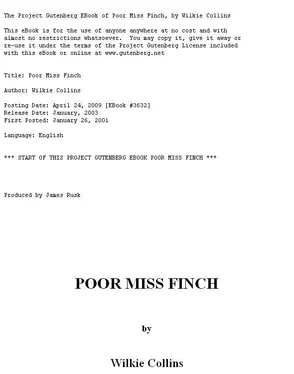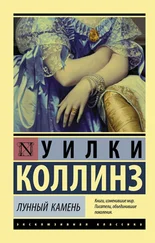Уилки Коллинз - Poor Miss Finch
Здесь есть возможность читать онлайн «Уилки Коллинз - Poor Miss Finch» весь текст электронной книги совершенно бесплатно (целиком полную версию без сокращений). В некоторых случаях можно слушать аудио, скачать через торрент в формате fb2 и присутствует краткое содержание. Год выпуска: 2002, Жанр: Классическая проза, на английском языке. Описание произведения, (предисловие) а так же отзывы посетителей доступны на портале библиотеки ЛибКат.
- Название:Poor Miss Finch
- Автор:
- Жанр:
- Год:2002
- ISBN:нет данных
- Рейтинг книги:3 / 5. Голосов: 1
-
Избранное:Добавить в избранное
- Отзывы:
-
Ваша оценка:
- 60
- 1
- 2
- 3
- 4
- 5
Poor Miss Finch: краткое содержание, описание и аннотация
Предлагаем к чтению аннотацию, описание, краткое содержание или предисловие (зависит от того, что написал сам автор книги «Poor Miss Finch»). Если вы не нашли необходимую информацию о книге — напишите в комментариях, мы постараемся отыскать её.
Poor Miss Finch — читать онлайн бесплатно полную книгу (весь текст) целиком
Ниже представлен текст книги, разбитый по страницам. Система сохранения места последней прочитанной страницы, позволяет с удобством читать онлайн бесплатно книгу «Poor Miss Finch», без необходимости каждый раз заново искать на чём Вы остановились. Поставьте закладку, и сможете в любой момент перейти на страницу, на которой закончили чтение.
Интервал:
Закладка:
Without dwelling on my disasters, let it be enough to say that I got up one morning, with three pounds, seven shillings, and fourpence in my purse; with my fervid temper, and my republican principles—and with absolutely nothing in prospect, that is to say with not a halfpenny more to come to me, unless I could earn it for myself.
In this sad case, what does an honest woman who is bent on winning her own independence by her own work, do? She takes three and sixpence out of her little humble store; and she advertises herself in a newspaper.
One always advertises the best side of oneself. (Ah, poor humanity!) My best side was my musical side. In the days of my vicissitudes (before my marriage) I had at one time had a share in a millinery establishment in Lyons. At another time, I had been bedchamber-woman to a great lady in Paris. But in my present situation, these sides of myself were, for various reasons, not so presentable as the pianoforte side. I was not a great player—far from it. But I had been soundly instructed; and I had, what you call, a competent skill on the instrument. Brief, I made the best of myself, I promise you, in my advertisement.
The next day, I borrowed the newspaper, to enjoy the pride of seeing my composition in print.
Ah, heaven! what did I discover? I discovered what other wretched advertising people have found out before me. Above my own advertisement, the very thing I wanted was advertised for by somebody else! Look in any newspaper; and you will see strangers who (if I may so express myself) exactly fit each other, advertising for each other, without knowing it. I had advertised myself as "accomplished musical companion for a lady. With cheerful temper to match." And there above me was my unknown necessitous fellow-creature, crying out in printers' types:—"Wanted, a companion for a lady. Must be an accomplished musician, and have a cheerful temper. Testimonials to capacity, and first-rate references required." Exactly what I had offered! "Apply by letter only, in the first instance." Exactly what I had said! Fie upon me, I had spent three and sixpence for nothing. I threw down the newspaper, in a transport of anger (like a fool)—and then took it up again (like a sensible woman), and applied by letter for the offered place.
My letter brought me into contact with a lawyer. The lawyer enveloped himself in mystery. It seemed to be a professional habit with him to tell nobody anything, if he could possibly help it.
Drop by drop, this wearisome man let the circumstances out. The lady was a young lady. She was the daughter of a clergyman. She lived in a retired part of the country. More even than that, she lived in a retired part of the house. Her father had married a second time. Having only the young lady as child by his first marriage, he had (I suppose by way of a change) a large family by his second marriage. Circumstances rendered it necessary for the young lady to live as much apart as she could from the tumult of a houseful of children. So he went on, until there was no keeping it in any longer—and then he let it out. The young lady was blind!
Young—lonely—blind. I had a sudden inspiration. I felt I should love her.
The question of my musical capacity was, in this sad case, a serious one. The poor young lady had one great pleasure to illumine her dark life—Music. Her companion was wanted to play from the book, and play worthily, the works of the great masters (whom this young creature adored)—and she, listening, would take her place next at the piano, and reproduce the music morsel by morsel, by ear. A professor was appointed to pronounce sentence on me, and declare if I could be trusted not to misinterpret Mozart, Beethoven, and the other masters who have written for the piano. Through this ordeal I passed with success. As for my references, they spoke for themselves. Not even the lawyer (though he tried hard) could pick holes in them. It was arranged on both sides that I should, in the first instance, go on a month's visit to the young lady. If we both wished it at the end of the time, I was to stay, on terms arranged to my perfect satisfaction. There was our treaty!
The next day I started for my visit by the railway.
My instructions directed me to travel to the town of Lewes in Sussex. Arrived there, I was to ask for the pony-chaise of my young lady's father—described on his card as Reverend Tertius Finch. The chaise was to take me to the rectory-house in the village of Dimchurch. And the village of Dimchurch was situated among the South Down Hills, three or four miles from the coast.
When I stepped into the railway carriage, this was all I knew. After my adventurous life—after the volcanic agitations of my republican career in the Doctor's time—was I about to bury myself in a remote English village, and live a life as monotonous as the life of a sheep on a hill? Ah, with all my experience, I had yet to learn that the narrowest human limits are wide enough to contain the grandest human emotions. I had seen the Drama of Life amid the turmoil of tropical revolutions. I was to see it again, with all its palpitating interest, in the breezy solitudes of the South Down Hills.
CHAPTER THE SECOND
Madame Pratolungo makes a Voyage on Land
A WELL-FED boy, with yellow Saxon hair; a little shabby green chaise; and a rough brown pony—these objects confronted me at the Lewes Station. I said to the boy, "Are you Reverend Finch's servant?" And the boy answered, "I be he."
We drove through the town—a hilly town of desolate clean houses. No living creatures visible behind the jealously-shut windows. No living creatures entering or departing through the sad-colored closed doors. No theater; no place of amusement except an empty town-hall, with a sad policeman meditating on its spruce white steps. No customers in the shops, and nobody to serve them behind the counter, even if they had turned up. Here and there on the pavements, an inhabitant with a capacity for staring, and (apparently) a capacity for nothing else. I said to Reverend Finch's boy, "Is this a rich place?" Reverend Finch's boy brightened and answered, "That it be!" Good. At any rate, they don't enjoy themselves here—the infamous rich!
Leaving this town of unamused citizens immured in domestic tombs, we got on a fine high road—still ascending—with a spacious open country on either side of it.
A spacious open country is a country soon exhausted by a sight-seer's eye. I have learnt from my poor Pratolungo the habit of searching for the political convictions of my fellow-creatures, when I find myself in contact with them in strange places. Having nothing else to do, I searched Finch's boy. His political programme, I found to be:—As much meat and beer as I can contain; and as little work to do for it as possible. In return for this, to touch my hat when I meet the Squire, and to be content with the station to which it has pleased God to call me. Miserable Finch's boy!
We reached the highest point of the road. On our right hand, the ground sloped away gently into a fertile valley—with a village and a church in it; and beyond, an abominable privileged enclosure of grass and trees torn from the community by a tyrant, and called a Park; with the palace in which this enemy of mankind caroused and fattened, standing in the midst. On our left hand, spread the open country—a magnificent prospect of grand grassy hills, rolling away to the horizon; bounded only by the sky. To my surprise, Finch's boy descended; took the pony by the head; and deliberately led him off the high road, and on to the wilderness of grassy hills, on which not so much as a footpath was discernible anywhere, far or near. The chaise began to heave and roll like a ship on the sea. It became necessary to hold with both hands to keep my place. I thought first of my luggage—then of myself.
Читать дальшеИнтервал:
Закладка:
Похожие книги на «Poor Miss Finch»
Представляем Вашему вниманию похожие книги на «Poor Miss Finch» списком для выбора. Мы отобрали схожую по названию и смыслу литературу в надежде предоставить читателям больше вариантов отыскать новые, интересные, ещё непрочитанные произведения.
Обсуждение, отзывы о книге «Poor Miss Finch» и просто собственные мнения читателей. Оставьте ваши комментарии, напишите, что Вы думаете о произведении, его смысле или главных героях. Укажите что конкретно понравилось, а что нет, и почему Вы так считаете.






